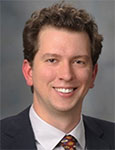
Purpose
The Epidemiology and Genomics Research Program hosts a webinar series entitled "Sequencing Strategies for Population and Cancer Epidemiology Studies (SeqSPACE)." The purpose of this forum is to provide an opportunity for our grantees and other interested individuals to share lessons learned and practical information regarding the application of next generation sequencing to cancer epidemiology studies.
Upcoming Topics and Speakers
Identification of Genes Associated with Testicular Germ Cell Tumors
3:00 p.m. to 4:00 p.m. ET
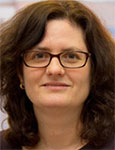
Katherine Nathanson, M.D.![]()
Pearl Basser Professor for BRCA-Related Research and Deputy Director, Abramson Cancer Center
Director of Genetics, Basser Research Center
Perelman School of Medicine
University of Pennsylvania
Dr. Katherine Nathanson is a Pearl Basser Professor for BRCA-Related Research and Deputy Director at the Abramson Cancer Center and Director of Genetics at the Basser Research Center, University of Pennsylvania. Her research focuses on both inherited susceptibility to cancer and somatic genetic characterization of tumors, with interests across multiple tumor types, including testicular germ cell tumors, hereditary breast and ovarian cancers, melanoma, and neuroendocrine tumors. She has led multiple studies elucidating the genetic underpinnings of hereditary breast and ovarian cancer and the seminal studies elucidating genetic variation leading to testicular cancer susceptibility and the underlying disrupted pathways, as the leader of the Testicular Cancer Consortium (TECAC). In this webinar, Dr. Nathanson will discuss identification of genes associated with testicular germ cell tumors and the TECAC.
Past Topics and Speakers
The list below includes topics, speakers, and recordings from the past two years plus selected webinars.
EGRP is dedicated to ensuring that our recorded webinars comply with Section 508 of the Rehabilitation Act (as amended) for individuals who are hearing and sight impaired. If you encounter any recorded webinar that does not meet your needs, please feel free to reach out to NCIEpiCommunications@mail.nih.gov.
2026
Junior Investigator Series, Part 2

Pathogenic Variants in Cancer Predisposition Genes and Risk of Prostate Cancer
Fei Chen, Ph.D., M.A.![]()
Assistant Professor of Clinical Population and Public Health Sciences
Keck School of Medicine of USC
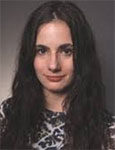
A Cross-population Two-sample Mendelian Randomization Study of Circulating Metabolomics and Prostate Cancer Risk
Harriett Fuller, Ph.D., M.S.![]()
Postdoc in Genetic Epidemiology
Fred Hutchinson Cancer Center
Dr. Fei Chen is an assistant professor of clinical population and public health sciences at Keck School of Medicine of USC. Her research focuses on understanding the genetic contribution to risk of common cancer, with a special emphasis on prostate cancer, breast cancer, and multiple primary malignancies (MPMs) in cancer survivors. Dr. Chen examined the impact of germline pathogenic variants in cancer predisposition genes on the risk of prostate cancer and explore development of cancer risk models.
Dr. Harriett Fuller is a postdoctoral research fellow in genetic epidemiology at Fred Hutchinson Cancer Center. Her research leverages multi-omics data to identify prospective molecular biomarkers for prostate cancer, with a particular emphasis on detecting markers of aggressive disease across population groups. She has expertise in molecular and genetic epidemiology, including biomarker prediction, polygenic risk score development, and Mendelian randomization, as well as a strong background in epidemiological methodology and nutritional epidemiology. Dr. Fuller described the results of a Mendelian randomization study exploring the association of specific circulating metabolites with prostate cancer risk.
2025
Junior Investigator Series, Part 1

Leveraging Mitochondrial Genome to Predict Posttransplant Outcomes in Patients with Myelodysplastic Syndromes
Jing Dong, Ph.D.![]()
Assistant Professor of Medicine
Medical College of Wisconsin

Rare Genetic Variant Contributions to Multiple Cancers
Austin Hammermeister Suger, M.S.![]()
PhD Student, Department of Epidemiology
University of Washington
Dr. Jing Dong is an assistant professor of medicine at Medical College of Wisconsin. Research at her lab focuses on integrating cutting-edge omics technology into large epidemiologic cohorts to build a multidisciplinary research program for developing approaches to reduce cancer burden. Austin Hammermeister Suger is a Ph.D. student in the Department of Epidemiology at University of Washington. His research is focused on examining the relationships between rare genetic variation and multiple cancer types.
In this webinar, Dr. Dong explored the association of mitochondrial DNA variants with outcomes of hematopoietic cell transplantation as predictors of survival, and Mr. Hammermeister Suger presented on his research, particularly the fifteen genes that showed associations across a range of individual cancer types tested.
Integrative Analysis and Visualization Platform for Cancer Regulatory Genomics

Zhiping Weng, Ph.D.![]()
Professor and Chair
Department of Genomics and Computational Biology
Li Weibo Chair in Biomedical Research
UMass Chan Medical School

Nezar Abdennur, Ph.D.![]()
Assistant Professor
Department of Genomics and Computational Biology
Department of Systems Biology
UMass Chan Medical School
Dr. Zhiping Weng is a professor and chair in the Department of Genomics and Computational Biology and the Li Weibo Chair in Biomedical Research at UMass Chan Medical School. Her research encompasses genomics, epigenomics, transcriptomics, and molecular recognition, with a focus on large-scale data analysis and computational modeling. Her lab has made significant contributions to understanding gene regulation, protein-protein interactions, and the annotation of regulatory elements in the human and mouse genomes.
Dr. Nezar Abdennur is an assistant professor in the Department of Genomics and Computational Biology and Department of Systems Biology at UMass Chan Medical School. His work has contributed to the discovery and understanding of the biophysical processes shaping genomes and laid foundational open source software for 3C/Hi-C analysis.
In this webinar, Drs. Weng and Abdennur presented on the integrative analysis and visualization platform for cancer regulatory genomics.
Using Genetics to Improve Biomarkers for Cancer Screening: An Application to Prostate-specific Antigen (PSA) and Prostate Cancer

John Witte, Ph.D., M.S.![]()
Professor, Departments of Epidemiology and Population Health, Biomedical Data Sciences, and Genetics
Stanford School of Medicine
Dr. John Witte is a professor in the Departments of Epidemiology and Population Health, Biomedical Data Sciences, and Genetics at Stanford School of Medicine. He is also vice chair of Epidemiology and Population Health and co-leader of the Population Sciences program in the Stanford Cancer Institute. He is an internationally recognized expert in genetic epidemiology, and his scholarly contributions include deciphering the genetic and environmental basis of prostate cancer and developing widely used methods for the genetic epidemiologic study of disease. In this webinar, Dr. Witte presented on using genetics to improve biomarkers for cancer screening and applying this strategy in examining prostate-specific antigen (PSA) and prostate cancer.
2024
SeqSPACE 10 Year Anniversary: Past, Present, and Future

Melissa B. Davis, PhD![]()
Director, Institute of Translational Genomic Medicine
Georgia Research Alliance Distinguished Investigator
Breast Cancer Research Foundation Investigator
Executive Director, MSM Diversity Center for Genomic Research - NHGRI
Team Lead/PI, SAMBAI, NCI/CRUK Cancer Grand Challenges

Kimberly F. Doheny, PhD![]()
Professor of Genetic Medicine
Johns Hopkins University School of Medicine

Alexander Gusev, PhD![]()
Associate Professor of Medicine
Harvard Medical School and Dana-Farber Cancer Institute
Moderators:

Tabitha Harrison, MPH![]()
Research Scientist
University of Washington School of Public Health

Fredrick Schumacher, PhD, MPH![]()
Associate Professor, Department of Population and Quantitative Health Sciences, School of Medicine
Case Western Reserve University
The Sequencing Strategies for Population and Cancer Epidemiology Studies (SeqSPACE) webinar series began 10 years ago (in November 2014). The series was designed to share lessons learned about the application of next generation sequencing to cancer epidemiology research. In this special webinar, organized to mark this milestone, Kimberly Doheny, PhD; Alexander Gusev, PhD; and Melissa Davis, PhD reflected on lessons learned, opportunities and challenges, and their vision for the future of sequencing in cancer epidemiology. The webinar was moderated by Fredrick Schumacher, PhD, MPH and Tabitha Harrison, MPH, who have been moderating this series since its inception.
Proteogenomic Insights into Non-small Cell Lung Cancer Biology and Epidemiology

Michael Gillette, MD, PhD![]()
Senior Group Leader, Proteomics and Biomarker Discovery
Broad Institute of MIT and Harvard
Dr. Michael Gillette is a senior group leader in proteomics and biomarker discovery at the Broad Institute of MIT and Harvard. He is also a pulmonary and critical care medicine attending and associate physician at the Massachusetts General Hospital, an assistant professor of medicine at Harvard Medical School, and an associate editor for Molecular & Cellular Proteomics. Dr. Gillette’s interests include clinical proteomics and biomarker development. With other Broad colleagues, he was involved in the development and implementation of all aspects of a coherent biomarker discovery-to-verification pipeline. With Proteomics Platform director Steve Carr, he led Broad Institute efforts in breast and ovarian cancer proteomic biomarker discovery and in molecular characterization of infectious diseases of high international health import, including pediatric febrile illness and tuberculosis. In this webinar, Dr. Gillette presented on proteogenomic insights into non-small cell lung cancer biology and epidemiology.
Opportunities and Challenges for the Use of Common Controls in Sequencing Studies

Audrey E. Hendricks, PhD![]()
Associate Professor, Biomedical Informatics
University of Colorado Anschutz Medical Campus
Dr. Audrey E. Hendricks is an associate professor of biomedical informatics at the University of Colorado Anschutz Medical Campus. Her team at the Hendrick’s Lab serves as the lynch pin between biomedical research and statistical and machine learning method development. They develop and apply methods to improve the utility and equity of large, publicly available genetic data resources, identify the biological mechanisms of healthy diets, and elucidate the genomic underpinnings of conditions and traits. In this webinar, Dr. Hendricks presented on the opportunities and challenges of using common controls in sequencing studies as well as methods and applications in this area.
Leveraging Population-Based Registries for Genomic Studies of Pediatric Cancer

Philip Lupo, PhD![]()
Professor, Pediatrics and Hematology-Oncology
Baylor College of Medicine
Dr. Philip Lupo is a professor of pediatrics and hematology-oncology at Baylor College of Medicine. His lab focuses on the molecular epidemiology of pediatric disease and conditions. Areas of interest include understanding the risk of cancer among children with structural birth defects; determining inherited genes underlying susceptibility to rhabdomyosarcoma; phenomic and genomic studies of structural birth defects; and addressing disparities in acute lymphoblastic leukemia susceptibility and outcomes. In this webinar, Dr. Lupo presented on leveraging population-based registries for genomic studies of pediatric cancer.
2023
Human Pangenome Reference

Ting Wang, PhD![]()
Sanford C. and Karen P. Loewentheil Distinguished Professor of Medicine
McDonnell Genome Institute, Washington University School of Medicine in St. Louis

Karen Miga, PhD![]()
Assistant Professor, Biomolecular Engineering Department
Associate Director, UCSC Genomics Institute
University of California, Santa Cruz
Dr. Ting Wang is a Sanford C. and Karen P. Loewentheil Distinguished Professor of Medicine at the McDonnell Genome Institute, Washington University School of Medicine in St. Louis. Dr. Wang’s lab investigates epigenetic determinants of cell fates in normal development and regeneration, in cancer, and in evolution, by integrating cutting-edge experimental and computational technologies. His lab developed widely used DNA methylomics technologies, algorithms to identify regulatory motifs and modules, and analytical and visualization tools to integrate large genomic and epigenomic data.
Dr. Karen Miga is an assistant professor in the Biomolecular Engineering Department at the University of California, Santa Cruz (UCSC). She is also the associate director of the UCSC Genomics Institute. In addition, she co-leads the Telomere-to-Telomere (T2T) Consortium and is the project director of the Human Pangenome Reference Consortium (HPRC) Production Center at UCSC. Her lab aims to uncover a new source of genetic and epigenetic variation in the human population, which is useful to investigate novel associations between genotype and phenotype of inherited traits and disease.
In this webinar, Drs. Wang and Miga presented on the human pangenome reference. They discussed resources that describe the tools and methods used in the pangenome and T2T, including the consortium website![]() , the UCSC Genome Browser
, the UCSC Genome Browser![]() , and the WashU Epigenome Browser
, and the WashU Epigenome Browser![]() .
.
Prioritizing Disease-Critical Variants, Genes, and Cell Types Using Genetic and Genomic Data

Kushal Dey, PhD![]()
Assistant Member and Josie Robertson Investigator, Department of Computational and Systems Biology
Assistant Professor, Gerstner Sloan Kettering Graduate School of Biomedical Sciences
Sloan Kettering Institute, Memorial Sloan Kettering Cancer Center
Dr. Kushal Dey is an assistant member and Josie Robertson investigator in the Department of Computational and Systems Biology at the Sloan Kettering Institute, Memorial Sloan Kettering Cancer Center. He is also an assistant professor at the Gerstner Sloan Kettering Graduate School of Biomedical Sciences. In this webinar, Dr. Dey discussed his work at the Kushal Dey Lab![]() , which builds statistical and machine learning models that integrate genetic and genomic data to prioritize variants, genes, and cell types, and to decode the causal functional architecture underlying heritable complex diseases — including immune-related diseases, like Alzheimer’s and inflammatory bowel disease, and heritable cancers, like breast cancer.
, which builds statistical and machine learning models that integrate genetic and genomic data to prioritize variants, genes, and cell types, and to decode the causal functional architecture underlying heritable complex diseases — including immune-related diseases, like Alzheimer’s and inflammatory bowel disease, and heritable cancers, like breast cancer.
Incorporating Common and Rare Genetic Variants into Polygenic Risk Scores of Prostate Cancer

Burcu F. Darst, PhD![]()
Assistant Professor, Public Health Sciences Division
Fred Hutchinson Cancer Center
Dr. Burcu F. Darst is an assistant professor in the Public Health Sciences Division at the Fred Hutchinson Cancer Center. Her research is focused on identifying and understanding genetic and multi-omic risk factors of prostate cancer in diverse populations. In this webinar, Dr. Darst presented on her effort to improve the utility of polygenic risk scores and rare genetic variants for the prediction of prostate cancer across patient populations.
UCSC Genome Browser and BRCA Exchange: Data Resources for Clinical Variant Interpretation
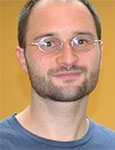
Maximilian Haeussler, PhD![]()
Research Scientist
UCSC Genome Browser Co-PI
University of California, Santa Cruz Genomics Institute

Melissa Cline, PhD
Program Manager, BRCA Exchange
University of California, Santa Cruz Genomics Institute
Dr. Maximilian Haeussler is the co-PI for the UCSC Genome Browser![]() , an interactive website offering access to genome sequence data from a variety of vertebrate and invertebrate species and major model organisms, integrated with a large collection of aligned annotations. Dr. Melissa Cline is program manager of the UCSC BRCA Exchange
, an interactive website offering access to genome sequence data from a variety of vertebrate and invertebrate species and major model organisms, integrated with a large collection of aligned annotations. Dr. Melissa Cline is program manager of the UCSC BRCA Exchange![]() , a project which aims to advance the understanding of the genetic basis of breast, ovarian, pancreatic, and other cancers by pooling data on BRCA1/2 genetic variants and corresponding clinical data from around the world. In this webinar, Drs. Haeussler and Cline discussed these programs and data resources for clinical variant interpretation.
, a project which aims to advance the understanding of the genetic basis of breast, ovarian, pancreatic, and other cancers by pooling data on BRCA1/2 genetic variants and corresponding clinical data from around the world. In this webinar, Drs. Haeussler and Cline discussed these programs and data resources for clinical variant interpretation.
Count Me In: Partnering with Patients to Define the Landscape of Rare, Aggressive Sarcomas
Joint webinar with the Cancer Moonshot Seminar Series
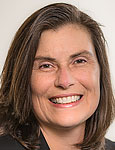
Katherine Janeway, MD![]()
Pediatric Hematologist-Oncologist and Investigator
Dana-Farber Cancer Institute
Dr. Katherine Janeway is a pediatric hematologist-oncologist and investigator at the Dana-Farber Cancer Institute with a research focus of pediatric sarcomas. With her presentation "Count Me In: Partnering with Patients to Define the Landscape of Rare, Aggressive Sarcomas," Dr. Janeway addressed the Cancer Moonshot Research initiative to Establish a Network for Direct Patient Engagement.
Selected Webinars
Early Detection of Cancer: Challenges and Opportunities
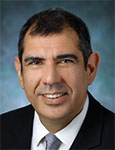
Nickolas Papadopoulos, PhD![]()
Professor
Oncology and Pathology
Director of Translational Genetics
Ludwig Center for Cancer Genetics & Therapeutics
Sidney Kimmel Comprehensive Cancer Center
Dr. Nickolas Papadopoulos is a professor of oncology and pathology at the Johns Hopkins University School of Medicine. His research focuses on cancer biology, genetics, and diagnostics. Dr. Papadopoulos is internationally known as a co‐discoverer of the genetic basis of the predisposition to hereditary nonpolyposis colon cancer (HNPCC), one of the most common hereditary forms of cancer. In this webinar, Dr. Papadopoulos presented on liquid biopsies and challenges and opportunities in early detection of cancer.
Next Generation Sequencing and Tumor Initiation and Progression

Christina Curtis, PhD, MSc![]()
Associate Professor of Medicine and Genetics, Stanford University School of Medicine
Co-Director, Molecular Tumor Board, Stanford Cancer Institute
Dr. Christina Curtis is an Associate Professor in the Departments of Medicine (Oncology) and Genetics in the School of Medicine at Stanford University where she leads the Cancer Computational and Systems Biology Group and is Co-Director of the Molecular Tumor Board at the Stanford Cancer Institute. The Curtis laboratory is focused on the development and application of innovative experimental, computational, and analytical approaches to improve the diagnosis, treatment, and early detection of cancer. Dr. Curtis presented on next generation sequencing and tumor initiation and progression.
Polygenic Risk Scores: Development, Validation and Applications

Nilanjan Chatterjee, PhD![]()
Bloomberg Distinguished Professor
Professor, Biostatistics, Johns Hopkins School of Public Health
Professor, School of Medicine, Johns Hopkins University
Professor, Epidemiology, Johns Hopkins School of Public Health
Dr. Chatterjee leads a broad research program in quantitative research that cuts across multiple areas of modern population-based biomedical science including statistical genetics/genomics, precision medicine and big data. The scientific goals of his studies include discovery of new biomarkers, understanding disease mechanisms, characterizing disease risk and developing risk-stratified approaches to disease prevention. In this webinar, Dr. Chatterjee presented research on polygenic risk scores.
SeqSPACE Co-Chairs
- Tabitha Harrison, MPH
 , University of Washington
, University of Washington - Fredrick Schumacher, PhD, MPH
 , Case Western Reserve University
, Case Western Reserve University
SeqSPACE Planning Committee
- Elizabeth Gillanders, PhD, Branch Chief, Genomic Epidemiology Branch
- Leah Mechanic, PhD, MPH, Program Director, Genomic Epidemiology Branch
- Melissa Rotunno, PhD, Program Director, Genomic Epidemiology Branch
- Katie Kortokrax, M.Ed., Public Affairs Specialist, Office of the Associate Director
